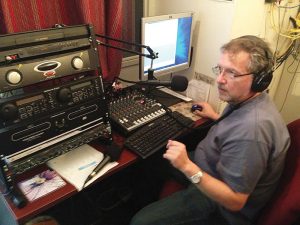By Max Miller – Staff Writer – [email protected]

MAIN-FM host Mark West records a promo at the station’s downtown studio.
Local radio station MAIN-FM secured a low-power radio license and resumed broadcasting this summer following a 10-year struggle, adding to the many opportunities for Asheville locals to become involved in radio.
The radio station was developed in 1996 with a goal of bringing independent radio to Western North Carolina. The station fought to pass the Local Community Radio Act, which passed in 2010 and reduced restrictions on low-power FM stations that had been put in place to serve corporate radio interests. MAIN-FM now broadcasts on 103.7 FM, and features syndicated shows and local, independent programs.
“I respect the mission of MAIN, which is to bring local voices back into local media,” said Jill Boniske, co-chair of MAIN-FM’s radio committee. “Most of the media here isn’t local voices, and if it is local voices, it’s corporate local voices. We have no corporate overlords. It’s really about letting people of the community really hear about what’s going on here.”
The station funds its activities with community donations, small grants and profits from its secondary business role as a local Internet service provider. The station seeks volunteers to bring the Asheville area a diverse array of music and talk programs.
“Right now, we’re trying really hard to get new voices,” Boniske said. “Since we were off the air for a long time, we were streaming online during all that time, but I don’t believe we added any new programming. And a lot of our stuff is syndicated from other places, so we’re really working right now to get new shows from local people.”
“Carolina Clean Air Acts,” a local citizen journalism program that exemplifies the station’s mission to broadcast local voices, debuted on MAIN-FM on Sept. 17. The show is produced and directed by Mark West, UNC Asheville mass communications, Ph.D and Patricia Furnish, Blue Ridge Community College history professor.
“The news today, to my mind, has become dominated by corporate interests and a sort of ‘both-sides-of-the-story’ mentality that I think is really ruinous,” West said. “So my partner Patricia Furnish and I became interested in doing something in terms of radio journalism.”
West said “Carolina Clear Air Acts” aims to take a more in-depth look at specific news stories of interest in a way they could not be covered on traditional radio or TV news, West said.
“Patricia and I go tomorrow to interview the archaeologist who found the earliest Western settlement in North Carolina, which, it turns out, was not the Lost Colony, but a settlement by Spaniards near Morganton,” West said. “The goal of our show is to do things that wouldn’t ever be covered on normal commercial media because they take 30 minutes and thought. This idea of moving back the clock on Western settlement 30 years and also moving the focus from England to Spain takes some thought and understanding.”
“Carolina Clear Air Acts” airs bi-weekly on Tuesdays at 7 p.m. Each show focuses on one issue, allowing West and Furnish to analyze the topic thoroughly and also tackles more thought-provoking material. The focus narrowly tailors the shows to better engage its audience, West said.
“I think the problem with TV news as it stands today is that people do it and hope that it finds 500 million listeners,” West said. “What ends up happening is that everyone is unhappy because it’s done for no one in particular, which means, in the final analysis, it’s done for no one.”
West, who got his start in mass communications through radio, will offer a radio news production course next semester, allowing UNCA students to better understand professional broadcast techniques so they can aptly volunteer through stations like MAIN-FM or UNCA’s campus radio station the Blue Echo.
The Blue Echo functions as a student activity, and currently has no ties with any course or academic department. The station broadcasts online and welcomes volunteers from many disciplines to try out their budding interests in radio.
“Most of our majors are not mass comm or any similar major. We have pretty much every major under the sun coming here,” said Drew Proctor, Blue Echo station manager. “And that’s one of the things — we like keeping it really open. We don’t have any requirements in order to become a DJ, really.”
Though the Blue Echo remains unaffiliated with any department, West said the mass communications department’s inclusion of radio curriculum could benefit the station.
“I hope that, with time, the Blue Echo will become more routine, more organized and have a greater amount of by-in in a number of ways from faculty and from students, and I’d like to be able to help with that,” West said. “I’d like to have a greater percentage of skills courses in radio as time goes on, so I think that will be helpful to the Blue Echo and to the students as a whole.”


![Brooke Pedersen [second from the right] and Luis Reyes [right] hold banners during the Wrap The Woods event.](https://thebluebanner.net/wp-content/uploads/2025/09/ELIZABETH_PRITCHITT_IMG_3470-1200x804.jpg)
















